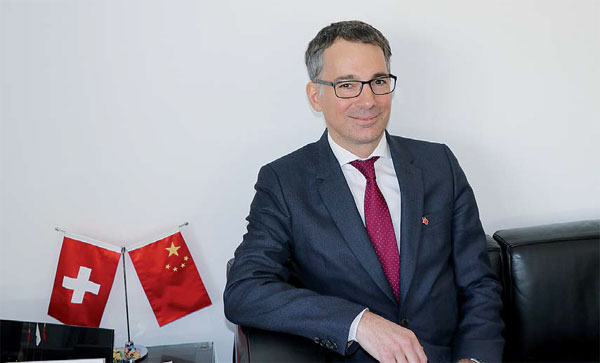China and Switzerland grow ever closer
Diplomat says European country is willing to share its innovation experience
President Xi Jinping's upcoming visit to Switzerland is expected to deepen the bilateral strategic innovative partnership, which is unique among diplomatic practices, a senior Swiss diplomat says.
Alain Gaschen, minister and deputy head of mission at the Swiss Embassy in China, noted that the priority of China's 13th Five-Year Plan (2016-20) is innovation - creating an economy that is more sustainable - and said Switzerland has a lot to offer on that issue.
"Swiss products are competitive because of innovation and high quality," he tells China Daily. "If we deepen the free trade agreement, we will have companies with high technology, with much added value that can contribute to China high-end economy.
|
Alain Gaschen, minister and deputy head of mission at the Swiss Embassy in China, says Switzerland has taken more visa facilitation measures to encourage Chinese tourists in recent years. An Baijie / China Daily |
"Switzerland is year after year the most innovative country in the world, so it does make sense for China and Switzerland to team up on that," he says, adding that innovation in an all emcompassing way is at the core of the relationship between the two countries.
Xi will pay a state visit to Switzerland from Jan 15 to 18, attending activities including the 47th World Economic Forum in Davos.
China and Switzerland established an innovative strategic partnership in April during a state visit to China by Johann Schneider-Ammann, the country's president at the time. It was the first such partnership China had developed with another country.
Switzerland also became an observer country in the partnership between China and 16 Central and Eastern European countries.
Switzerland is willing to share its innovation experience with China, especially its excellent manufacturing industries, the embassy's Gaschen says.
"We already have more than 20 dialogues underway in many areas, from the environment, labor and human rights to other topics, including intellectual property, finance, migration - you name it," he says.
Last year, Switzerland opened a new general consulate in Chengdu, Sichuan province - the fifth Swiss diplomatic representation in China after the embassy in Beijing and three other general consulates in Shanghai Guangzhou and Hong Kong.
"We have taken some visa facilitation measures - such as quick visa approval taking only two days and issuing long-term and multi-entry visas - to encourage Chinese tourism to Switzerland," he says, adding that Switzerland's refusal of tourism visa applications is below 2 percent in China.
"I believe the presence of President Xi and the Swiss snow will attract more Chinese tourists," he says.
Figures from the Swiss government show that 2015 saw a 33 percent increase in the number of hotel bookings by Chinese tourists. China has for the first time become the fourth-largest source of tourists for Switzerland, behind Germany, the United States and the United Kingdom.
Simon Bosshart, an official at Switzerland Tourism, says the country's resorts are ready to welcome Chinese guests in an appropriate manner.
"For example, we have 19 ski resorts that offer one-day ski experiences this winter. These are experiences for absolute beginners who want to give it their first try. Another example: 10 resorts are providing Chinese-speaking ski instructors," Bosshart told Xinhua News Agency in an earlier report.
Noting that Switzerland welcomes the China-led Belt and Road Initiative, Gaschen says the initiative would bring Europe and Asia closer together and boost economic and social development along the route.
"We have Swiss business with companies that can contribute to infrastructure, transportation and clean energy. Switzerland can contribute to and benefit from the initiative," he says.
The Silk Road Economic Belt and the 21st Century Maritime Silk Road initiatives, put forward by Xi in 2013, aim to revive ancient trade routes, with an emphasis on infrastructure.
Switzerland has been supportive in being a founding member of the Asian Infrastructure Investment Bank. The AIIB, launched in late 2015, issued loans totaling $1.73 billion (1.63 billion euros; 1.41 billion) for nine infrastructure projects in seven countries in 2016.
The embassy's Gaschen spoke highly of China's role in international affairs, and says he hopes China will renew its commitment to global issues and affairs, world peace, climate change, free trade and open markets during Xi's state visit.
"We noticed that in the last years China is increasingly taking a great role and responsibility and commitment to global issues including peace-keeping operation, climate change and the Agenda 2030, the sustainable developing goals," he says. Gaschen sees room for a stronger cooperation between the two countries in all these fields.
Gaschen says China and Switzerland could enhance cooperation in the winter sports sector.
"Winter sports were actually born in Switzerland, and they're just part of our national identity," he says, adding that Switzerland will host the 2020 Olympic Winter Youth event in Lausanne, which also provides opportunities for cooperation.
Switzerland was among the first Western countries to establish diplomatic relations with the People's Republic of China, and was among the first group of European countries to recognize China' market economy status. The first industrial joint venture China entered into was with Switzerland.
In December, Foreign Minister Wang Yi told reporters in Switzerland that the two countries should effectively implement the innovative strategic partnership as a new impetus for world economic growth.
Saying that the free trade agreement has benefited both sides, Wang called on the two countries to send out a positive signal that they are committed to safeguarding the world trade system.
"We should take the discussion on the upgraded version of the agreement as an opportunity to jointly facilitate trade liberalization," Wang said.
anbaijie@chinadaily.com.cn



















